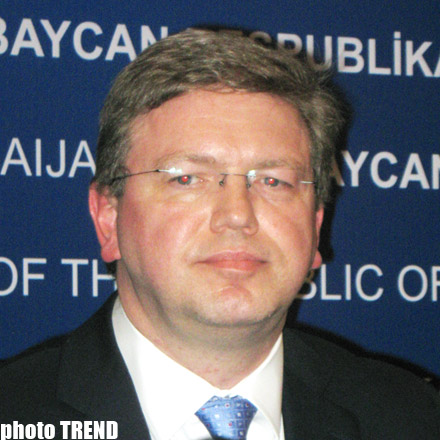Azerbaijan, Baku, March 4 / Trend E.Ostapenko /
In the turmoil and exuberance of the past weeks in the Arab East, a number of voices have questioned the future direction of the EU's relations with the Eastern Partners, European Commissioner for Enlargement and Neighborhood Policy Stefan Fule said.
Fule ade such a statement at the GLOBSEC 2011 Bratislava Global Security Forum opened in Bratislava on Wednesday, the EU reported.
"Some argue that the progress as regards so-called "Western values" such as respect for human rights, democratic principles and the rule of law has given way under the weight of the post-Soviet legacy of corruption, cronyism and increasing authoritarianism," Fule said.
"Let me be clear," he said. "The European Union's determination to deepen relations with our partners in the East is unwavering. Those same considerations that have driven forward our relations over the past 20 years continue to be relevant today. Closer relations between us are essential in securing greater stability, prosperity and democracy in Europe."
Fule believes 2011 is proving to be an extraordinary year of change with reasons for both optimism and anxiety.
"Like 1989 and 1990 in Central and Eastern Europe, the changes that we are witnessing will resonate into the future. Europe needs to be ready to respond to these events with determination, imagination and solidarity," he added.
Massive popular protests has recently covered a number of Arab states and led to the downfall of the ruling regimes in Egypt and Tunisia. The riots continue in Libya, Yemen, Iraq and Bahrain. Anti-government demonstrations were also held in Algeria and Jordan.
In his speech, Fule named the achievements of the Eastern Partnership Program, under which the EU cooperates with six post-Soviet countries - Azerbaijan, Georgia, Moldova, Ukraine, Belarus and Armenia.
The program does not envisage opportunities for EU membership, but instead envisages facilitating the visa regime, energy cooperation, and the introduction of free trade zones. Small projects on student exchange, environmental protection, and energy supply will also be implemented.
Fule noted the beginning of negotiations on association agreement with a number of countries among the achievements of the program.
The first round of negotiations on the EU Association Agreement with the three South Caucasus countries - Azerbaijan, Georgia and Armenia was held in July 2010. The agreements are based on joint commitment to develop common values and cover a wide range of areas including political dialogue, justice, freedom and security, as well as issues of trade and cooperation.
Fule also touched upon the achievements in sphere of facilitating the movement between the EU and the Eastern Partnership. He mentioned the announcement of the Action Plans for Ukraine and Moldova towards the establishment of visa free regimes for short stay travel. Visa facilitation and readmission agreements came into force with Georgia on March 1.
Preparations are under way for negotiations of similar agreements with the other countries of the Eastern Partnership not already benefiting from such Agreements, Fule said.






